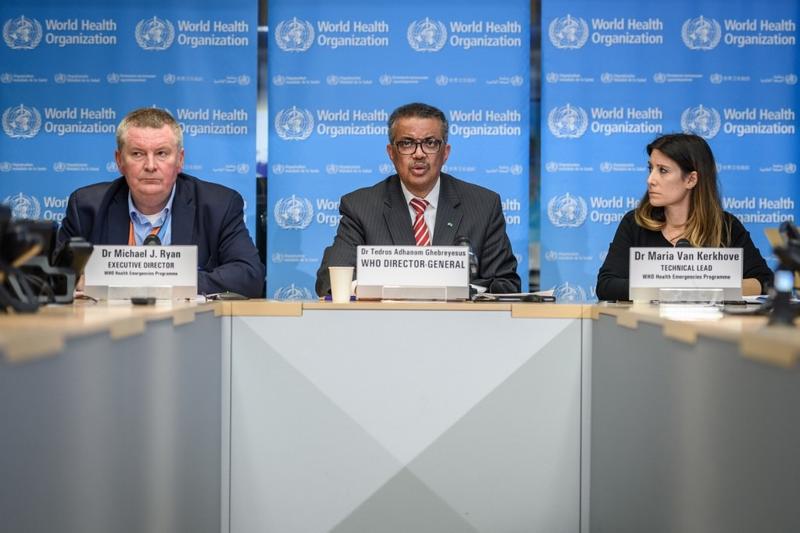 From left: World Health Organization (WHO) Health Emergencies Programme Director Michael Ryan, WHO Director-General Tedros Adhanom Ghebreyesus, and WHO Technical Lead Maria Van Kerkhove attend a daily press briefing on COVID-19, at the WHO headquaters in Geneva on March 11, 2020. (FABRICE COFFRINI / AFP)
From left: World Health Organization (WHO) Health Emergencies Programme Director Michael Ryan, WHO Director-General Tedros Adhanom Ghebreyesus, and WHO Technical Lead Maria Van Kerkhove attend a daily press briefing on COVID-19, at the WHO headquaters in Geneva on March 11, 2020. (FABRICE COFFRINI / AFP)
BRUSSELS/GENEVA/UNITED NATIONS/BEIJING - The World Health Organization (WHO) on Wednesday characterized the COVID-19 outbreak as a "pandemic."
The Geneva-based WHO's assessment came as the coronavirus has infected more than 20,000 people across Europe, forcing European countries to impose more travel restrictions, among others, to contain the spread of the virus.
Describing the situation as a pandemic does not change what the WHO is doing and what countries should do, the WHO chief said, calling on the international community to take urgent and aggressive actions to contain the pandemic
The number of people who died of COVID-19 outside China climbed to 1,130 as of Wednesday morning, an increase of 258 deaths from the previous day, according to the daily report released by the WHO.
There are now more than 118,000 confirmed cases in 114 countries and regions, and 4,291 people have lost their lives, WHO Director-General Tedros Adhanom Ghebreyesus said at a press conference on Wednesday.
ALSO READ: Japan lower house passes emergency bill, Iran toll jumps
Bolivia, Jamaica, Burkina Faso and the Democratic Republic of the Congo have reported coronavirus cases for the first time in the past 24 hours as of Wednesday morning.
In addition, five countries - Serbia, Albania, Saudi Arabia, Tunisia, Paraguay - have seen local transmission of COVID-19, raising the total number of countries and regions where local transmission emerged to 66 in addition to China.
The WHO's report also shows the coronavirus infects people of all ages, among which older people and those with underlying medical conditions are at a higher risk of getting severe COVID-19 disease.
"We have therefore made the assessment that COVID-19 can be characterized as a pandemic," Tedros said.
Michael Ryan, executive director of the WHO's health emergencies program, warned against the danger of using the word "pandemic" to make people give up rather than act
"We have never before seen a pandemic sparked by a coronavirus. And we have never before seen a pandemic that can be controlled at the same time," Tedros added.
ALSO READ: WHO: COVID-19 pandemic threat very real, but controllable
He noted that the number of coronavirus cases, deaths, as well as affected countries, is expected to climb even higher in the days and weeks ahead.
Describing the situation as a pandemic does not change the WHO's assessment of the threat posed by the novel coronavirus, nor does it change what the WHO is doing and what countries should do, Tedros said.
However, the WHO chief called on the international community to take urgent and aggressive actions to contain the pandemic. "We have rung the alarm bell loud and clear," he said.
Answering a question from Xinhua during Wednesday's conference, Michael Ryan, executive director of the WHO's health emergencies program, said pandemic "is a characterization or description of the situation." He denied that such a move would trigger anything other than more aggressive and intensive action.
The WHO has made many internal and external consultations in assessing the use of the word "pandemic" as a characterization of COVID-19, he added, warning against the danger of using the word to make people give up rather than act.
READ MORE: Latin American countries order school closures over virus fears
UN Secretary-General Antonio Guterres on Wednesday called for action on the novel coronavirus that causes COVID-19 but warned against panic, after the WHO declared the disease a pandemic.
According to the WHO website, a pandemic is defined as "the worldwide spread of a new disease".
A pandemic does not necessarily refer to the severity of a disease, but has something to do with concern over its geographic spread. Another definition put forth in the book Epidemiology 101 says that a pandemic is "an epidemic occurring worldwide, or over a very wide area, crossing international boundaries and usually affecting a large number of people."
The term is most often applied to new influenza strains, and "an influenza pandemic occurs when a new influenza virus emerges and spreads around the world, and most people do not have immunity," the WHO states on its website. "Viruses that have caused past pandemics typically originated from animal influenza viruses."


